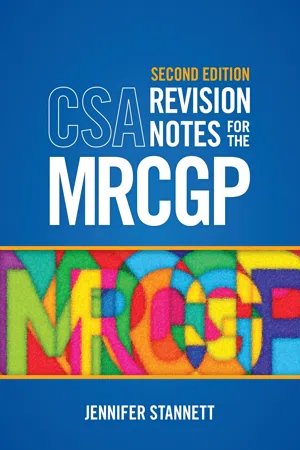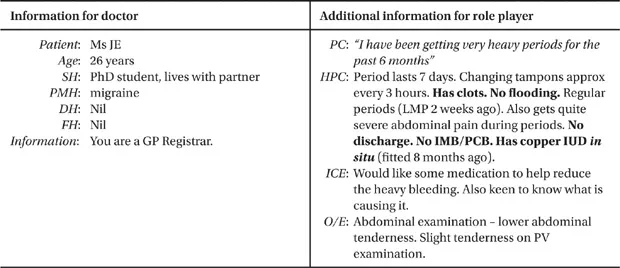
- 236 pages
- English
- ePUB (mobile friendly)
- Available on iOS & Android
CSA Revision Notes for the MRCGP, second edition
About this book
This bookhelps you to revise and prepare for the CSA part of the MRCGP exam. The new edition features an additional 11clinical scenarios, all presented in the same standardised format to helpyou to improve your:
* data gathering – a broad range of appropriate questions to ask the patient are provided and red flags are highlighted where appropriate
* interpersonal skills – eachclinical problem is described using terms that you can use in your explanationsto patients
* clinical management – tellsyou which examinations to consider, which investigations to order, and how tomanage each clinical problem based on the latest guidelines and current bestpractice
* consultations – to help youpractise, every clinical case features a realistic role play scenario, all of which have been extended withadditional information in the new edition.
Every clinical scenario in this new editionhas been updated and new appendices have been added to cover driving and thelatest DVLA guidelines, and when to suspect child maltreatment.
The book isdesigned to be used as a workbook, with wide margins to allow you to add inyour own notes, questions and other aides-memoires. Used in this way, CSA Revision Notes for the MRCGP is the ideal book to help you successfully prepare for the exam.
From reviews of the first edition:
"Following the glowing reviews of this book I bought it for my CSApreparation. It is a very well written book and a good resource for the CSA. Ilike the lay out with different case scenarios presented in the CSA style of –data gathering, interpersonal skills and clinical management. I like the openquestions and focused questions for each scenario and the role play idea at theend of each case scenario. Interestingly this is the recommended read from ourVTS programme."
Tools to learn more effectively

Saving Books

Keyword Search

Annotating Text

Listen to it instead
Information
Women’s health
Menorrhagia
Data gathering
Open question
Focused/closed questions
HPC: | “When did the heavy periods first start?” “Was the heavy bleeding sudden in onset?” (red flag) “How many times do you change pads/tampons in a typical day?” “Do you get any clots in the blood or any flooding?” “Are your periods more painful than usual?” “Do you get any abdominal pain or abdominal bloating?” “Are your periods regular? When was your last menstrual period?” “Do you get any bleeding in between your periods or after sex?” (red flag) “Are you using any contraception at present? If so, what?” “When was your last smear test?” “Any abnormal discharge or risks of any sexually transmitted infections?” |
PMH: | Any other medical conditions? Any previous gynaecological surgery? Any previous pregnancies? |
DH: | “Are you on any regular medications?” (specifically enquire about aspirin and anticoagulants) |
FH: | Any conditions that run in the family? Any bleeding disorders? |
ICE: | “Do you have any thoughts as to what might be causing the heavy bleeding?” “How is this problem affecting your day to day life?” |
Examination: | • Abdominal/pelvic examination (red flags include pelvic mass and features of PID). • Speculum examination. N.B. Offer chaperone. |
Clinical management
Investigations
Explanation to patient
Management
Role play

Amenorrhoea
Data gathering
Open question
Focused/closed questions
HPC: | “Have you ever had periods? If so, when was your last menstrual period?” “At what age did you start having periods (if secondary amenorrhoea)?” “Is there any chance you could be pregnant?” “Are you sexually active at present?” “Have there been any recent change in your weight or any increase in exercise?” “Have you been more stressed than usual recently?” “Have you noticed any changes to your skin or hair?” “Any lower abdominal pain?” (haematocolpos) “Any hot flushes or vaginal dryness?” (menopause/premature ovarian failure) “Have you ever had problems trying to get pregnant?” “Any headache, problems with your vision or leakage of milk from your breasts?” (red flags) |
PMH: | Any medical conditions? PCOS? Thyroid problems? Depression? Eating disorders? Previous surgery? |
DH: | “Do you take any regular medications?” Any hormonal contraceptives? Antipsychotics? Previous radiotherapy or chemotherapy? Steroids? |
FH: | Any family history of menstrual problems? “When did your mother and sister(s) start their periods?” Any family history of stopping periods before 40 years of age? |
SH: | Occupation/Studying? Stress? Who lives with you at home? Any problems? Illicit drug use, e.g. cocaine or opiates? |
ICE: | “Do you have any thoughts as to why your periods might have stopped?” |
(based on NHS CKS, 2009, Amenorrhoea – management):
• BMI, BP. • Examine for secondary sexual characteristics, e.g. Tanner Stages (N.B. no intimate examinations in the CSA). • Examine for hirsutism, clitoromegaly, galactorrhoea and haematocolpos (if appropriate from history). • Thyro... |
Table of contents
- Cover
- Title Page
- Copyright Page
- Contents
- Preface to the second edition
- About the author
- Acknowledgements
- Preface
- Abbreviations
- Introduction to the CSA examination
- General practice consultation
- Healthy people: promoting health and preventing disease
- Genetics in primary care
- Care of acutely ill people
- Child health
- Care of older adults
- Women’s health
- Men’s health
- Sexual health
- Care and palliative care of people with cancer
- Mental health
- Cardiovascular
- Respiratory
- Gastrointestinal and renal
- ENT
- Ophthalmology
- Neurology
- Rheumatology and musculoskeletal
- Dermatology
- Endocrinology
- Drug and alcohol problems
- Appendices
Frequently asked questions
- Essential is ideal for learners and professionals who enjoy exploring a wide range of subjects. Access the Essential Library with 800,000+ trusted titles and best-sellers across business, personal growth, and the humanities. Includes unlimited reading time and Standard Read Aloud voice.
- Complete: Perfect for advanced learners and researchers needing full, unrestricted access. Unlock 1.4M+ books across hundreds of subjects, including academic and specialized titles. The Complete Plan also includes advanced features like Premium Read Aloud and Research Assistant.
Please note we cannot support devices running on iOS 13 and Android 7 or earlier. Learn more about using the app